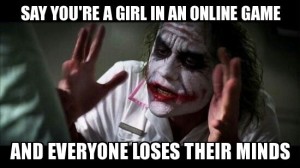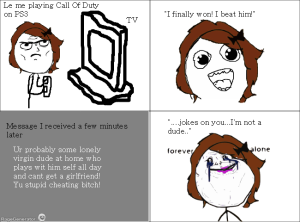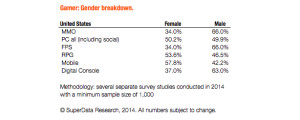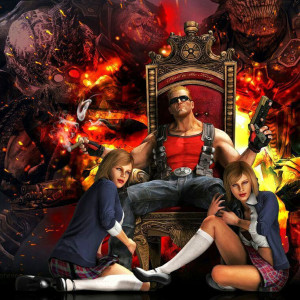
Although many video games are sexist, many people focus on how they are sexist towards women and not how the sexism found in video games questions an individual’s femininity and masculinity in general. The idea surrounding that the world of gamers consists of only males was true years ago but as of recent studies, that idea has been entirely shattered due to a change in demographics. Despite this change in demographics, this idea still plagues our generations today. These changes in gaming demographics (specifically consoles, computer gaming included) will be a much needed push to develop more people friendly video games.
Games of many types are sexist and gendered. However, before I continue into why this topic grew into such an importance that it drove me to write about it, I suggest watching the video of four year old Riley on Marketing. Gender as a social construct had become so blatant that even a four year old was aware that she had a limited amount of options because of the gender norms tied to her sex. Sometimes it isn’t as conspicuous as colored coded toys assigned to each gender, but appear in more innocuous forms. For example, many people have played the games from Super Mario franchise. A harmless, animated game that a player can easily become engrossed in just playing the game and dodging shells and grabbing mushrooms that the object of the game which is to save the damsel in distress, Princess Peach becomes easily forgettable.
Though we may think World of Warcraft is for the man in his mother’s basement, that’s not true. At least not anymore. Games are—or at least should be—for everyone, but there are many games that undermine that sentiment. There’s a perception that those who own the gamer culture are straight, white men. This perception makes sense, seeing as video game companies have marketed to white males for decades now, and everything that they see in games says ‘women are here for your visual pleasure.’ Playing games is not gendered! But at some point during the earlier stages of gaming, it was lost and this space has since been marketed as a men’s space, and now that’s changing.
Grasping the sexism and gender inequality that exists in video games did not really sink into my brain until I was a teenager. I  have been a gamer since I was about six years old. I would watch my cousins and my older brother play their violent fighting games or first person shooter games without realizing any of the subtext within the game and its characters. At the time, if I wanted to play, I simply could without any hostile comments towards my gender.
have been a gamer since I was about six years old. I would watch my cousins and my older brother play their violent fighting games or first person shooter games without realizing any of the subtext within the game and its characters. At the time, if I wanted to play, I simply could without any hostile comments towards my gender.
As I got older and encountered the online platform of gaming through consoles, my gender became a problem and it was as my friends and I were harassed online that it truly clicked for me. Truth be told, I avoided the online platform just to avoid any kind of harassment from other players. Many women choose gender neutral usernames online or play with their headset off so that players cannot hear whether or not they are female. They try to avoid calling attention to themselves because what we will hear resembles comments like this, ‘get back in the kitchen,’ which compared to what most female users hear, is among some of the less harsh remarks.
Sexist depictions of women, objectification and lack of diversity of the female form as depicted in the previous images are just some of the abundant ways video games discriminate against women. Objectification, fetishism, a hostility toward female gamers, sexual harassment, gendered games, and the overall assumption that female gamers are incompetent and lack skill make the gaming world an unwelcoming place for females. It’s not hard to see why this is so after scrolling through the comments in Jenny Haniver’s website, looking at a couple of gameplays and game advertisements. Ubisoft, a game company goes as far as saying that “women are just too difficult to animate,” in response to questions regarding an abandoned attempt to provide a female character option for one of their most recent Assassin’s Creed games, Assassin’s Creed: Unity despite others coming out and saying that their claim was rather exaggerated. Ubisoft really enjoys holding onto their white, male protagonists.
The video game series of Grand Theft Auto. Among many of the discriminatory choices you can execute, you can pick up a female sex worker and after vigorous love-making in your car, instead of the awkward one-night stand exit or if you cannot afford to pay her fee, you have the option of murdering her. Lollipop Chainsaw, another provocative example of sexism out of many, where even though there is a female protagonist, she has flat dialogue and fights zombies in a rather “aerodynamic” outfit (see first image). She’s the epitome of what people think many gamers want.
A survey from Pew Research Center that covers the issues around the gamer realm suggests that of the men surveyed, 50 % identified as gamers and of the women surveyed, 48 % identified as gamers.  Super Data designed a gamer breakdown, their research cracked down on gaming preferences for each gender. Some types of video games do not have much of a gap in interest at all while others are slightly dominated by one gender. However, while there are differences in taste, a balanced interest from both genders in gaming exists. The gap between genders that make video games out to be male dominated is an imagined one, or at least as of recent research. A study done by the Entertainment Software Association (ESA) shows that of the gamers studied, 53 % were male and 47% were female. The demographics have been changing and each time, the imagined chasm keeps closing and closing.
Super Data designed a gamer breakdown, their research cracked down on gaming preferences for each gender. Some types of video games do not have much of a gap in interest at all while others are slightly dominated by one gender. However, while there are differences in taste, a balanced interest from both genders in gaming exists. The gap between genders that make video games out to be male dominated is an imagined one, or at least as of recent research. A study done by the Entertainment Software Association (ESA) shows that of the gamers studied, 53 % were male and 47% were female. The demographics have been changing and each time, the imagined chasm keeps closing and closing.
 It’s important to note that video games do not exempt men from sexist portrayals. Characters like Duke Nukem depict negative, and hyper-masculine images. I mean, who would not want to be a brawny, muscular strapping man with his fabulously attired ladies? Hopefully no one, because this is a terrible depiction of masculinity. Unfortunately enough, many games avoid developing their male characters any further than the stereotypical white muscular male protagonist who is slightly rough around the edges. Companies like Ubisoft produce many games with the same recycled male protagonist where the hardest decision that burdens them is simply, to have facial hair or not? Many stereotypes exist for male characters and male gamers. Negative characteristics include, Misogyny, chauvinism, basement dwelling, hostility. These are only a few. This in turn stigmatizes the male demographic just as much as female gamers. It shortens the player pool so men who don’t specifically identify themselves with hyper masculinity feel intimidated. Therefore they become more transparent and irrelevant when it comes to designing games for male gamers.
It’s important to note that video games do not exempt men from sexist portrayals. Characters like Duke Nukem depict negative, and hyper-masculine images. I mean, who would not want to be a brawny, muscular strapping man with his fabulously attired ladies? Hopefully no one, because this is a terrible depiction of masculinity. Unfortunately enough, many games avoid developing their male characters any further than the stereotypical white muscular male protagonist who is slightly rough around the edges. Companies like Ubisoft produce many games with the same recycled male protagonist where the hardest decision that burdens them is simply, to have facial hair or not? Many stereotypes exist for male characters and male gamers. Negative characteristics include, Misogyny, chauvinism, basement dwelling, hostility. These are only a few. This in turn stigmatizes the male demographic just as much as female gamers. It shortens the player pool so men who don’t specifically identify themselves with hyper masculinity feel intimidated. Therefore they become more transparent and irrelevant when it comes to designing games for male gamers.
On the bright side, game franchises like Mass Effect and Resident Evil are more inclusive and diverse. These games provide more customizable characters, choices, and promote more positive  images especially the image of women. Bioware, is a company that produces Mass Effect and other people friendly games like Dragon Age. These games display women who are dressed appropriately for their action packed scenarios and their knowledge surpasses their physical attributes and use of a gun. These women are leaders and of course, in games like Mass Effect you create the personality around your character depending on the decisions you have them make. Resident Evil: Code Veronica, obligates you to play the first half of the game as the character Claire Redfield until you find her brother Chris Redfield. Claire is entirely capable and not just there to be aesthetically pleasing, or temptation to the male protagonist. She has brains, sense and braveness. These are some examples of franchises and games that have responded and are continuing to respond to the demands for games with better content but there are still many improvements to be made.
images especially the image of women. Bioware, is a company that produces Mass Effect and other people friendly games like Dragon Age. These games display women who are dressed appropriately for their action packed scenarios and their knowledge surpasses their physical attributes and use of a gun. These women are leaders and of course, in games like Mass Effect you create the personality around your character depending on the decisions you have them make. Resident Evil: Code Veronica, obligates you to play the first half of the game as the character Claire Redfield until you find her brother Chris Redfield. Claire is entirely capable and not just there to be aesthetically pleasing, or temptation to the male protagonist. She has brains, sense and braveness. These are some examples of franchises and games that have responded and are continuing to respond to the demands for games with better content but there are still many improvements to be made.
Why does any of this matter? Even though we’re talking about games, they affect us in real life. The way we treat each other and the way we treat sexism is not a game. Video games, like any other form of entertainment, influence our culture especially the younger generations and they help shape the people that they are going to become. Younger males are the primary audience of this platform of entertainment, and they’re given these types of games because that is what creators think they want but they are taught to desire content that demeans women, and defines masculinity in destructive ways.
No one is born wanting these things. Creating a ‘how to play’ guide and sliding it in between a variety of texts and forms of entertainment actually attributes how society relates to you and you to yourself. We can teach them to want better. We might think the games are a break from learning but they like, all other forms of entertainment, teach us something. We cannot think so little of people to imagine that they are not intelligent or empathetic enough to handle or desire forms of entertainment that handle the topic of gender in a positive and inclusive manner. We are truly missing out on a very good learning opportunity. Video games didn’t originate as “Gamer guys only” entertainment and were made with the intentions of being a source of entertainment for many people of many types. Somewhere along the way that has been lost and “no girls allowed” image was produced and swelled the gaming community. Games are and should be for everyone and we should work on bringing that back.
I think gender equality is currently one of the most hotly discussed topics across all scientific disciplines, political and religious ideologies, and workplaces. Although many scientific discussions explore how we can overcome gender inequalities, they highlight how little we know about the factors that trigger sexist behaviour and the individuals that instigate it. Understanding these factors is absolutely necessary to attaining equality. keep up the great work 😉
The way woman are depicted in games and how gamers react to woman online is just ridiculous. Don’t get me started on #Gamergate, we still have a long way to go…